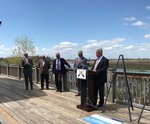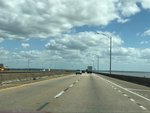

SPANISH FORT – A plan to reduce Interstate 10 congestion without putting tolls on existing roads includes a trucks-only bridge over the Mobile River and additional lanes on the Bayway, area officials said Monday, March 22.
The proposal was announced at a press conference at the Five Rivers Delta Resource Center on the Causeway. The chairmen of the Metropolitan Planning Organizations for the Eastern Shore and Mobile and other officials said that unlike previous plans, no tolls would be placed on roads now in place.
Under the plan, a new four-lane toll bridge would be built over the Mobile River. The bridge would only be for trucks 46-feet long or larger, Vince Calametti, an engineer working on the project, said. Cars and smaller trucks will continue to use the Wallace Tunnel to cross the river.
“So many of the traffic delays and tie-ups we experience today are because of large truck traffic in the tunnel,” Calametti said. “By taking large trucks out of the tunnel, preliminary estimates indicate the new truck-only bridge will decrease average passenger car delays by 60 to 90 minutes during peak times.”
The I-10 Bayway would be restriped to add an additional lane in each direction. “This will increase traffic flow by an estimated 40 percent and improve safety by separating cars and trucks into separate lanes,” Calametti said.
He said the total cost of the project is estimated at $725 million. State highway funds will pay $250 million. A federal grant will pay $125 million. The rest of the cost will be paid by tolls on trucks crossing the bridge. Calametti said the fees have not been determined, but the toll is expected to be $10 to $15.
Fairhope City Council President Jack Burrell, chairman of the Eastern Shore MPO, said the project will help relieve increasing congestion.
“Because we all live here, we know how extremely important it is to move traffic smoothly across the Bayway and through the tunnels, both the Wallace Tunnel and also the Bankhead Tunnel,” Burrell said. “You may or may not know this, but this corridor has been recognized as one of the most congested corridors in the entire nation. When it looked like an effort to address this problem came to a standstill, just over a year ago, some of us from both side of the bay continued to talk to one another. We knew that the problem was not going to go away on its own.”
Mobile Mayor Sandy Stimpson, chairman of the Mobile MPO, said the plans meets the requirements that MPO members proposed to Gov. Kay Ivey and the Alabama Department of Transportation.
“We asked the governor to direct ALDOT to present a conceptual plan to the MPOs that would do three things,” Stimpson said. “First, it would reduce traffic congestion. Second, it would protect the previously awarded $125 million federal grant that’s been received and, third, it will allow citizens to use all existing routes across the Bayway, all the previously existing routes, without paying any toll.”
Congressman Jerry Carl said the project is important not only for the Mobile Bay area, but the entire region. He said traffic congestion crossing Mobile Bay has received national attention.
“Washington, D.C. knows about this bridge,” Carl said. “I’m really shocked when talk to the different congressmen that have been stuck on that bridge going to and from Orange Beach, Gulf Shores and our beautiful coastline, which is exciting, because I don’t have to tell them a whole lot.”
Calametti said officials have not determined a schedule for construction. He said the project could start in 2022 or 2023 time frame and take about four years to complete.
Burrell said that before designs are complete and work begins, the public will have a chance to study the proposal and comment on the plan.
“There will be ample opportunity for public input, including public hearings,” Burrell said. “We also seek the views of our legislators, our business leaders, our economic developers and others to ensure the project receives the necessary local support.”
An earlier proposal had called for a new bridge over the Mobile River for all traffic and a new elevated Bayway. The cost estimate for the project was more than $2 billion. To pay that cost, state officials had proposed tolls for all traffic. State highway officials said the cost for a care making a one-way trip across the bay would be about $6.
In August 2019, the Eastern Shore MPO Policy Board voted to take the bridge off the Transportation Improvement Program list for 2020 to 2024. Members said the bridge was needed, but the proposed toll would hurt the area’s economy. After the board voted to remove the bridge from the list, Ivey declared the project dead.
Burrell said Monday that the current proposal has the support of MPO members.
“We have discussed this plan with the members of our respective MPOs and I am happy to report that the response to this plan has been very, very favorable,” Burrell said. “Under this plan, traffic will flow more smoothly with fewer delays. People and goods will be able to move more quickly, efficiently and predictably through our area and we will have a new and improved infrastructure to help not only with travel today, but we will also have a plan for future growth.”
More information on the project is available at www.mobilerivertruckbridge.com.